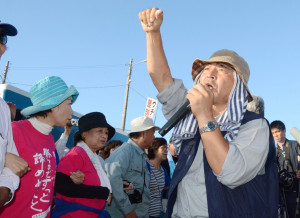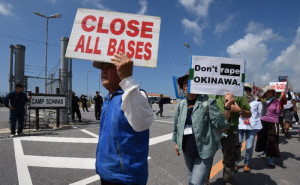Above: Okinawa peacemaker leader Hiroji Yamashiro speaks to base closure protesters. Source The Japan Times
Note: For more than two years the peacemakers of Okinawa have been holding a 24-hour vigil and sit-in against the construction of a massive US military base on their island in a pristine environmental area. During the day this vigil can grow to hundreds of people and on some days they have been able to block the construction of the base. We recently attended a meeting in Washington, DC with the Mayor of Nago City, Susumu Inamine.
The mayor has been part of the campaign to stop construction of a US naval base in Okinawa. During that meeting our attention was brought to a key leader of the protests, 64-year-old Hiroji Yamashiro, director of the Okinawa Peace Movement Center, who needs the help of all those who seek peace. Today, we are asking you to do what you can to help free him from unjust imprisonment.

Yamashiro has been under arrest since October 2016 and held incommunicado. The charges he is facing are a series of minor protest charges but all requests for bail have been denied. Authorities are making a series of charges because under Japanese laws that allows him to be held without any visitors.
Yamashiro has been described as “the master choreographer of the resistance.” The Japan Times in, “The Peacemakers of Okinawa,” describes Yamashiro, writing:
Despite a six-month bout with malignant lymphoma and two detentions by U.S. security guards, he has led demonstrations in all weathers, including scorching sun, typhoons and a rare smattering of snow.
Now Yamashiro picks up a megaphone and addresses the crowd in a blend of Japanese and Okinawan.
“The American military stole our land to build bases,” Yamashiro says. “Then they used these bases to wage wars around the world. If they build a new base here, they will use it to fight new wars.”
Tightening his trademark powder blue poncho, he leads the demonstrators toward the lines of riot police.
“If we win here, we can send a message of peace around the world,” he says. “But if we lose, there is no future. The fight is here. The time is now. Follow me to the gates!”

The article puts Yamashiro into the context of the long history of peace-making efforts by Okinawans who live in a nation that has been abused throughout the 20th Century by militarism of both Japan and the United States. We urge you to read this article to understand this history and the amazing people of Okinawa in their quest for peace. After reviewing this history and describing many great Okinawan peace activists, the article concludes with Yamashiro:
Despite receiving the prestigious Yoko Tada Human Rights Award last year, Yamashiro remains modest.
“I’m just an ordinary Okinawan man,” he says. “I’m not special — I grew up in a farming family. I feel history run through me and the tears of the Okinawan people.
“How we protest is the Okinawan way. Sometimes we sing and sometimes we dance. But we always fight hard with a smile. We are not afraid of anything — except habu snakes.”
Yamashiro laughs, then he turns serious.
“Okinawans have exactly the same dreams as Americans,” he says. “All we want is the return of our land and peaceful skies. All we are asking for is the right to decide the future for ourselves.”
The Okinawa resistance has managed to hold off the base construction so that major works initially planned in 1996 have yet to begin but with a Japanese Supreme Court decision against them they plan to proceed with construction this year. The arrest of Yamashiro coincides with their plans to escalate construction. KZ and MF

The silencing of an anti-U.S. base protester in Okinawa
By Lawrence Repeta for the Japan Times
When three antiwar activists were detained by the Tokyo police for 75 days in 2004, the Nobel Prize-winning international rights group, Amnesty International, formally declared them to be “prisoners of conscience,” thus tarring Japan’s reputation with a brush that is ordinarily reserved for the world’s most oppressive regimes.
 A similar story is playing out in Okinawa as I write this. There, a 64-year-old antiwar activist has been held in detention on trivial charges for more than 70 days. Over the past two years of peaceful protests against U.S. military base expansion in northern Okinawa, Hiroji Yamashiro emerged as the face of Okinawan resistance, the man with a megaphone in hand who urged crowds of protesters to speak out. Arrested on Oct. 17 and denied visits by anyone other than his attorneys since then, he has been silenced.
A similar story is playing out in Okinawa as I write this. There, a 64-year-old antiwar activist has been held in detention on trivial charges for more than 70 days. Over the past two years of peaceful protests against U.S. military base expansion in northern Okinawa, Hiroji Yamashiro emerged as the face of Okinawan resistance, the man with a megaphone in hand who urged crowds of protesters to speak out. Arrested on Oct. 17 and denied visits by anyone other than his attorneys since then, he has been silenced.
Japan’s criminal procedures are extremely harsh. Suspects can be held up to 23 days before the government is required to either file an indictment or release the detainee. Attorneys are not allowed to be present during interrogations. In Yamashiro’s case, the police have employed the insidious practice of serial arrests on unrelated charges in order to ensure an extended detention. He remains behind bars.
According to news reports, the first arrest was based on suspicion that he cut a wire fence at the U.S. helipad project at Takae. Later, he was arrested on the separate charge of injuring a Defense Ministry worker during a scuffle in August. On Nov. 11, he was indicted on both of these charges.
 After indictment, suspects are allowed to file requests for release on bail for the first time, but in Japan’s Kafkaesque system, courts usually deny these requests when opposed by prosecutors. On Nov. 29, Yamashiro was arrested yet again, this time on suspicion of obstructing official activities by placing concrete blocks in the road outside Camp Schwab. Police say the concrete block action occurred in January 2016. They waited for 10 months before making this arrest. The new arrests enabled them to commence interrogation of Yamashiro all over again.
After indictment, suspects are allowed to file requests for release on bail for the first time, but in Japan’s Kafkaesque system, courts usually deny these requests when opposed by prosecutors. On Nov. 29, Yamashiro was arrested yet again, this time on suspicion of obstructing official activities by placing concrete blocks in the road outside Camp Schwab. Police say the concrete block action occurred in January 2016. They waited for 10 months before making this arrest. The new arrests enabled them to commence interrogation of Yamashiro all over again.
Arrests were accompanied by police searches of Yamashiro’s home and the citizen group he leads, Okinawa Peace Movement Center. Regarding the search that accompanied the concrete block arrest, a fellow activist was quoted to say “How could they possibly find evidence related to events of almost a year earlier?” He was indicted a second time on Dec. 20.
Of course, the true reason for Yamashiro’s detention is that he has effectively led opposition to U.S. Marine Corps base expansion at Camp Schwab and the nearby Takae helipad area. Masses of protesters, sometimes in the hundreds, appear daily outside the gates to protest base expansion. Yamashiro has been the most prominent among them, urging protesters to continue their vigil and leading them in chants that condemn the occupation of Okinawan land by foreign military forces.
Despite the solid opposition of the Okinawan people, Japan’s national government has remained committed to base expansion in northern Okinawa. The government’s treatment of Yamashiro shows that it will not let international human rights principles stand in the way.
 The most important body of international human rights law is found in the International Covenant on Civil and Political Rights. The covenant took effect in 1976 and has been ratified by 158 countries. Japan ratified in 1979.
The most important body of international human rights law is found in the International Covenant on Civil and Political Rights. The covenant took effect in 1976 and has been ratified by 158 countries. Japan ratified in 1979.
The extended detention of a political activist like Yamashiro violates several provisions of the covenant. Article 9 prohibits arbitrary arrests and lengthy pre-trial detentions. Regarding detention, the language is uncompromising: detainees “shall be entitled to trial within a reasonable time or to release.” Moreover, Article 9 states “It shall not be the general rule that persons awaiting trial shall be detained in custody.” This language applies directly to the Yamashiro case. The covenant requires that Yamashiro be released pending trial.
Because arbitrary detention is a standard tool used by authoritarian governments to silence critics throughout the world, in 1988 the United Nations General Assembly adopted principles that prohibit lengthy detentions like this. Denial of communications and family visits is a special concern. U.N. Principle 15 expressly declares that communications with the outside world, and in particular family members, “shall not be denied for more than a matter of days.”
Moreover, there is the question of the government’s motivation. According to a working group of the U.N. Human Rights Council, when “the deprivation of liberty results from the exercise of rights or freedoms” such as freedom of speech and assembly, the police action is arbitrary and therefore violates Article 9. Yamashiro is a prominent leader of the Okinawan opposition to military base expansion. His detention is a direct restriction of the fundamental rights of freedom of speech and freedom of assembly, perhaps the most important principles of democratic government.
Above all, extended detention under harsh conditions prior to trial amounts to a rejection of our most important protection against unlimited police power: the presumption of innocence. Again, the International Covenant on Civil and Political Rights is unambiguous: Article 14(2) reads, “Everyone charged with a criminal offense shall have the right to be presumed innocent until proved guilty according to law.” The only purpose served by Yamashiro’s repeated arrests and detention is to punish a man who has never been convicted of any crime.

The extended detention of Hiroji Yamashiro is a shocking display of raw government power. The U.S. Marine Corps wants the big base complex it has been promised in northern Okinawa. In order to accommodate them, it appears that Japan’s government will put aside the most basic human rights protections in order to crush protesters like Yamashiro even as construction crews work offshore of Camp Schwab and in the adjacent Yambaru forest, crushing magnificent coral beds and chopping down trees by the thousand.
Lawrence Repeta is a law professor at Meiji University and a member of the Washington State Bar Association.

